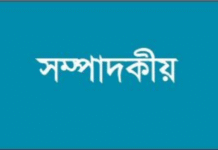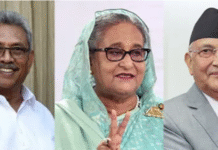SANDY WHITE AND IQBAL HUSSAIN
When Canadians think of Bangladesh they think of garment manufacturing and tragedy. In that vein, many will have seen headlines this week of the recent disaster where nearly 75 people perished in a ferry accident in the Muslim-majority nation of more than 150 million – the most densely populated large country in the world.
What most will not have heard about, however, is the continuing political turmoil that is paralyzing the country. Nearly two months ago, Bangladesh descended into chaos with more than 100 people killed in clashes over the legitimacy of the current government. Protests began on the anniversary of last year’s national elections, which opposition parties boycotted. Thousands of anti-government demonstrators have since been arrested amid reports of arson attacks and killings of opposition leaders. And last Thursday, prominent American-Bangladeshi anti-Islamic blogger Avijit Roy was murdered at a book fair in Dhaka by Islamic radicals who are exploiting the unrest.
The problems center on a decades-long feud between Prime Minister Sheikh Hasina and the ruling Awami League, and Khaleda Zia, leader of the opposition Bangladesh Nationalist Party. The two women have traded power for nearly 25 years.
Politics in Bangladesh has always been a bloody business. The country achieved independence from Pakistan in a brutal civil war in 1971, for which war-crimes tribunals are still handing out death sentences. Prime Minister Hasina is the daughter of an assassinated Bangladeshi pro-independence leader, country president and founder of the Awami League, while Khaleda Zia is the widow of another pro-independence soldier, country president, and founder of the BNP, who was assassinated by the military.
The primary concern among opponents of the government is Ms. Hasina’s suppression of all opposition, thereby establishing a de facto dictatorship. Historically, the army has acted as a safeguard for democracy – albeit a questionable one. The threat of a possible military intervention looms, but hope remains that tensions will subside before such measures become necessary.
Canadians should care about Bangladesh for two main reasons.
First, while it lacks the economic heft of India or China, or the security concerns of Pakistan or Iran, if the political situation stabilizes, Bangladesh serves as an important global reminder that Islam and democratic civil society are not incompatible.
Since its founding, Bangladesh has always been a as a secular Muslim nation with every branch of Islam, Christianity, Hinduism, Buddhism, and even Tribal Shamanism welcomed in Bengali society. Inter-marriage between faiths is common, the Hindu caste system is banned, and Muslim sectarian violence is all but non-existent. While an Islamist element has an undeniable presence in the country, its opponents are numerous, vocal and in control.
The country, formerly known as East Pakistan, fought its civil war with West Pakistan principally over linguistic, democratic and religious freedoms. Although it suffers from extreme poverty and deep political issues, Bangladesh is mostly absent of type of fundamentalism that afflicts much of the Middle East – even as the world’s fourth largest Muslim nation. The principal Islamic party, the Jamaat-e-Islami, while allied with the BNP against the Awami League, is a minority group wielding little influence.
Secondly, Bangladesh is the world’s eighth most populous country and a growing trade partner for Canada, and therefore holds enormous opportunities for growth in the coming years – both financial and humanitarian.
Trade between the two countries nearly quadrupled since Bangladesh signed a duty free market agreement with Canada in 2003, increasing from $478-million in 2003 to nearly $1.9-billion in 2013. Canada exports agri-food, metals, machinery and electronics, while imports primarily consist of textiles. Bangladesh’s textile industry is the world’s fifth largest, yet production has declined substantially due to the recent tensions.
To add to this, Bangladesh has been one of Canada’s largest development assistance recipients for decades, and in 2014 was named as a country of focus for Canada’s foreign aid, with Canada hoping to improve economic and educational opportunities for youth and women. Literacy rates are low, internet penetration is weak, corruption is rampant and roughly 35 per cent of the population is under the age of 15. Yet these challenges are in themselves great opportunities if addressed properly.
It should not be forgotten that Bangladesh is the nation that brought the world the Grameen Bank which helped lift millions out of poverty – proof that the country can rise to face its great challenges.
While a large portion of Bangladeshis are desperately poor – the country ranks 146th out of 187 on the United Nations Human Development Index with an estimated 30 per cent of the population living on less than $1.25/day – considerable progress has been made toward Bangladesh meeting the Millennium Development Goals, notably in health and education. GDP has grown 6 per cent per year on average, only slightly below such high performers as India and Indonesia, and population growth and poverty are declining.
Bangladesh may continue to suffer as political unrest festers under the “Battling Begums”, as Hasina and Zia are known. Yet when the violence stops, the country remains an ideal partner for Canada to increase its economic base and regional influence, and to help grow a healthy, educated, strong, free and secular Muslim nation.
Source: The Globe And Mail










